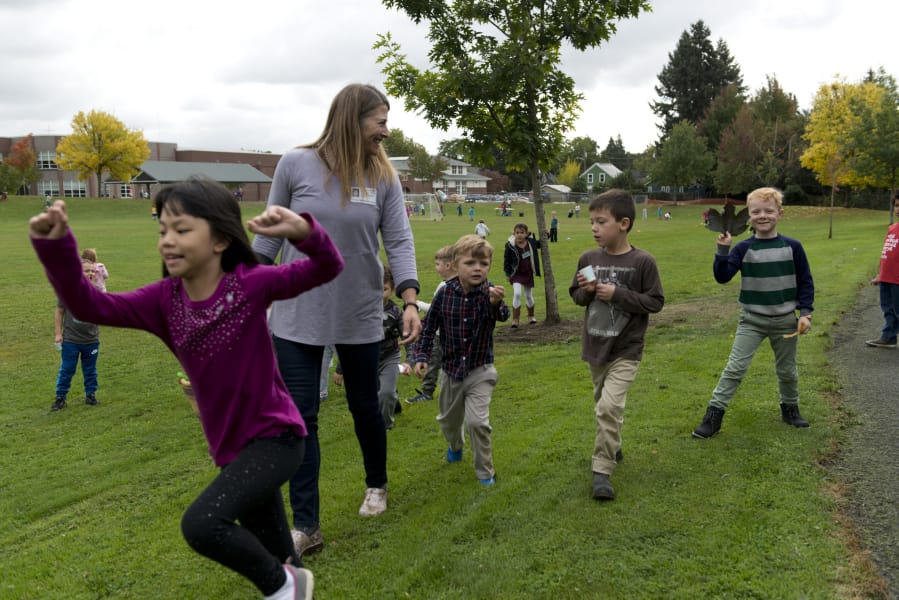Seven-year-old Phoenix Helfrich sat at an outside table with other Hough Elementary School students, pressing orange chalk onto a white piece of paper to reveal the outline of an autumn leaf.
Phoenix was one of about three dozen kids who chose to spend their recess with the school’s Green Team overseen by horticultural therapist Cheri Larsen. The girl decided drawing and learning about fall foliage was better than participating in a running activity.
“I love nature,” Phoenix said. “I ride my bike every day with my friend to see it.”
As the bell rang and recess ended, Phoenix ran off toward the school building but circled back to grab the leaf she’d been pressing.
It’s the second year Larsen has instructed and guided children through nature-related activities, which she said offers the kids a moment of respite from the classroom and its real or perceived stress.
“Mood and behavior improve, body and mind are exercised and friendships bloom,” Larsen said.
A budding program
The Hough Foundation, a decades-old nonprofit that supports Hough neighborhood and school programs through grants and an army of volunteers, funded the hiring of the horticultural therapist to run the Green Team and an after-school garden club.
Put simply, horticultural therapy is using nature, generally gardens, to positively affect mood and behavior.
According to the American Horticulture Therapy Association, it was first documented in the 19th century as a way to help individuals with mental illness. The practice has grown over time as an accepted therapy for numerous settings, such as the care of military veterans and the elderly.
Larsen is starting out on a new career path as a horticultural therapist. She is a registered professional through the national association, a designation she earned through internship work at Legacy Gardens in Portland, a geriatric care facility in Gresham, Ore., and at Hough Elementary last year.
She said she’s most passionate about working with kids and hopes to apply what she’s learned to childhood education. Hough Elementary is one of the only schools in the area — or anywhere, really — to implement this kind of program, Larsen said.
“Without a doubt, the best part of my job is facilitating and witnessing the magical moments of quiet fascination that occur when a child focuses on the details in nature or becomes completely engaged in the activity,” she said.
Under gray October skies, Larsen led groups of students around the school’s soccer field to collect foliage for the leaf-rubbing activity.
She picked up a red maple leaf and told a group of kindergartners similar leaves would soon change color. The kids crouched over and plucked maple, ash and oak leaves off grass and then tossed them into a big white bucket.
“Guys, over here!” Jaime Madsen shouted at his classmates as he shook a small tree with a handful of violet leaves left on its otherwise bare branches. The kids ran over to help Jaime before Larsen corralled them to finish the remainder of their miniature nature walk.
Feeling of ownership
The nature-centric instruction involves much more than the recess activities. The pilot therapeutic program was developed and implemented at the elementary last school year, but parent volunteers have been incrementally building a school garden for six years.
One of the parent volunteers, Jane Tesner Kleiner, has helped to plan, build and maintain the garden and additional outdoor learning spaces, which include a classroom with a stage, a replica of the Columbia River and an alphabet garden.
Tucked away in a corner of the school grounds is a flower and butterfly garden. Enormous sunflowers were toppled over onto a bed of soil featuring withering flowers due to dropping temperatures. Posts were erected at spots around the garden, so if a butterfly is seen flying by, students can run to signs on the posts and correctly identify the winged insects.
The garden effectively brings students of various grades together, Kleiner said. It also gives special needs students an opportunity to interact with their classmates.
“Working with the garden builds ownership and pride in the school, and the students are building relationships they wouldn’t otherwise make,” Kleiner said, adding that the garden work and other program activities also fulfill science curriculum standards.
‘A busy schedule’
Fifth-grader Summer McKay decided to take part in the leaf-pressing activity. She opted for a pencil instead of the provided chalk, making her drawings more pronounced than her peers’.
“I just thought I’d try it today,” Summer said, sitting by a handful of classmates. “I usually have a busy schedule.”
She said recess is one of the only opportunities she gets to run around and be herself, and she likes the chance to join in on the Green Team.
Larsen leads the occasional participants like Summer and other kids who use their green thumbs at every given opportunity. Her position is funded by a grant through the end of the school year, and she hopes to not only keep it going in the years ahead, but to expand it to other neighborhood schools.
The glowing endorsements of Summer and Phoenix help, but research should also sway the school district to keep it running. Studies say that children who have daily access to nature are calmer, less stressed and can even see improved test scores, the organizers said.
“My passion is children,” Larsen said. Horticultural therapy “is not really something that’s in a lot of school settings yet, so breaking into it is a challenge. But the goal is to get funding for more schools.”




